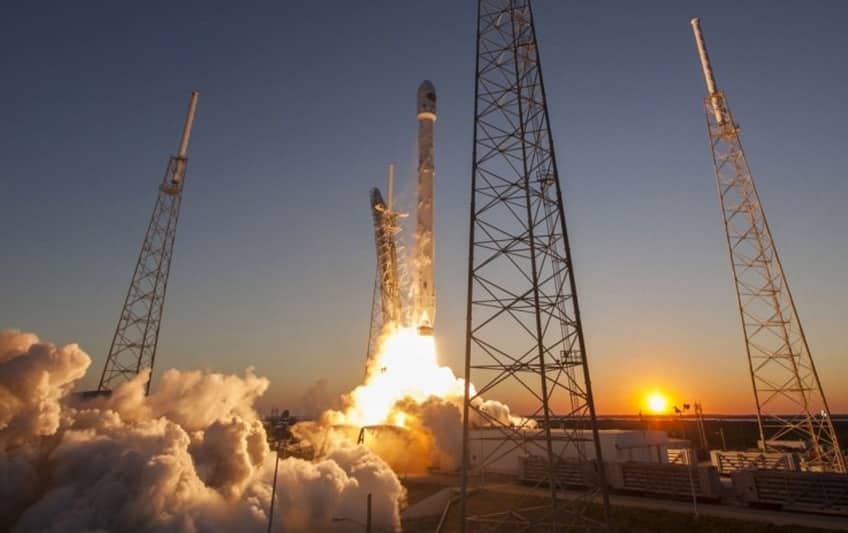
Today, the first Costa Rican satellite was launched into space. Since February 21st, the device was delivered to the Japanese Agency for Aerospace Exploration (JAXA), which was responsible for sending it to space, along with other satellites and supply equipment for the International Space Station (ISS), this April 2nd and is going to be launched from Cape Canaveral, located in the Eastern coast of Florida.
It was possible to observe the takeoff live, as the company in charge of its launching, SpaceX with the famous rocket Falcon 9, broadcasts – through its YouTube account – all its launches.
The Irazu Project (Proyecto Irazú) is the name of the project which made possible the first Costa Rican and Central American satellite to be launched in this space mission. This device was placed in orbit with the objective of collecting data about the effects of climate change in the country and studying the process of carbon dioxide fixation.
Irazu Project is a satellite that has a cube shape and measuring only 10 centimeters on each side, precisely this technology is called CubeSat. The goal of it being so small is to reduce the costs of missions that are carried out off Earth. The total costs for manufacturing and shipping the satellite are around $ 580,000.
This project began in 2009 when Central American Association of Aeronautics and Space (ACAE) was formed, and since then the satellite has had to go through different stages such as design, assembly and testing. The project gained strength thanks to the donations of more than 900 people on the Kickstarter platform, which totaled nearly $ 80,000 that were used to purchase specialized parts and shipping costs to space.
The TEC also disposed of $ 500,000 that covered the salaries and social charges of researchers and seniors who developed the project for two years.
Last March, the organization in charge of the Special Systems Laboratory of TEC (SETEC-Lab) of the Technological Institute of Costa Rica (TEC) and the Central American Association of Aeronautics and Space (ACAE), reported that the satellite had passed all the tests to which he was subjected -in Japan- and that it was ready to be sent to space in just under a month.
In Japan, the satellite was received by two Costa Rican students, Juan José Rojas and Marcos Hernández, who are part of the scientific team that performed the satellite’s final tests. The satellite had to be tested at the Kyutech Technological Institute, in Fukuoka, where there are laboratories that simulate the extreme conditions that exist outside the Earth, to verify its correct functioning.
With the arrival of the Irazu Project in space, more accurate information about the growth rate of the trees can be obtained, since the satellite will collect data twice a day. Currently, these measurements are made once a month.
The satellite will be connected to a remote station located on the campus of the TEC regional headquarters in San Carlos, where sensors were placed to measure the growth of the trees. Thus, the information collected by the device will be used to estimate the levels of carbon fixation in forests.
With the arrival of this satellite in space, it will be possible to measure the growth of forest biomass in a period of six months (time that the satellite will be in space) and how it correlates with a quantity of carbon sequestered.
For the country, this is an important step taking into account the efforts that are being made to strengthen the aerospace cluster, which aims to promote research and product development for this industry. The launch represents for Costa Rica an advance to promote the knowledge economy and the impulse that is wanted to give to the aerospace production.
Luis Diego Monge, manager of the ACAE project, explained that this satellite marks the beginning of Costa Rica’s presence in space and shows the world the ability of professionals to participate in a space mission. Years ago, the aerospace industry was weakened by the lack of articulation between the private sector, the public and the academy.
It happened that a company in the country that was involved in this activity was forced to reject contracts with other firms because it lacked the components for aerospace products.
The proposal made by the Foreign Trade Promoter (Promotora de Comercio Exterior or Procomer) was that this need was covered by companies that were under the same umbrella of collaboration, and in this case, it was the conformation of the aerospace cluster that was announced in March 2016.
Professionals who work in electro mechanics, design, software development, the creation of intelligent panels and sensors, are part of the beneficiaries with the creation of this business tissue. Currently, this group is integrated by companies such as Ad Astra Rocket, Atemisa Precision, Avionyx and Camtronics, among others.
“The launch of this satellite sends a very strong message to companies that want to settle in the country; we would love to receive the aerospace industry and also for those who want products from cluster companies. The goal is for the satellite to also stimulate sales”, Monge added.
“We are very proud to demonstrate that in Costa Rica there is the ability to make space systems that meet the rigorous standards of the Japanese Aerospace Exploration Agency without problems to launch a satellite into space. (…) With this, we fulfill TEC’s mission to be the spearhead of the country’s technological development”, commented Adolfo Chaves, coordinator of SETEC-Lab.
Undoubtedly, this is a great step for Costa Rica in terms of Aeronautics. If you have more information related and want to share it with us, please feel free to contact us, we will love to hear from you!
We are active members of the most important tourist associations, both national and international.
To navigate this site use a different one than Microsoft Explorer.